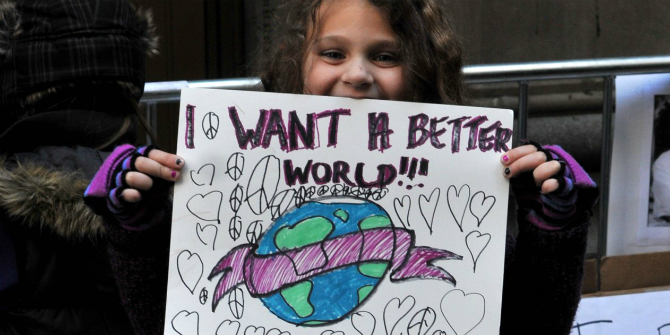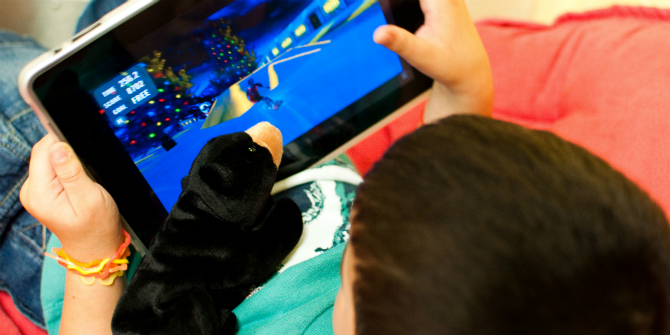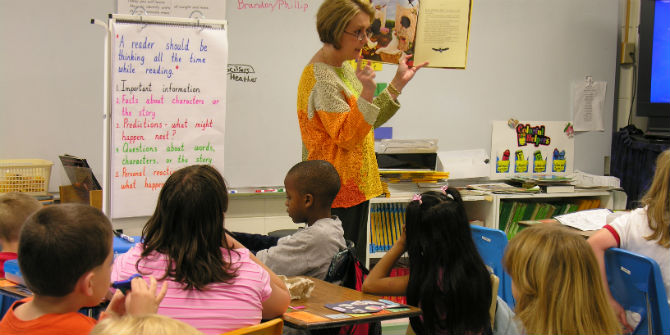 Veronica Barassi explores digital parenthood and the everyday construction of children’s digital profiles. She argues that children’s data flows are not only connected to questions about identity and privacy, but to new questions about ‘digital citizenship’. Veronica is an anthropologist in the Department of Media and Communications at Goldsmiths University. She is one of the founders of the Goldsmiths Media Ethnography Group and principal investigator on the ‘Social Movements and Media Technologies: Present Challenges and Future Developments’ ESRC Seminar series. [Header image credit: Viewminder, CC BY-NC-ND 2.0]
Veronica Barassi explores digital parenthood and the everyday construction of children’s digital profiles. She argues that children’s data flows are not only connected to questions about identity and privacy, but to new questions about ‘digital citizenship’. Veronica is an anthropologist in the Department of Media and Communications at Goldsmiths University. She is one of the founders of the Goldsmiths Media Ethnography Group and principal investigator on the ‘Social Movements and Media Technologies: Present Challenges and Future Developments’ ESRC Seminar series. [Header image credit: Viewminder, CC BY-NC-ND 2.0]
On the 15th of February, 2016 an article appeared on the Madame Figaro, which addressed the legal dilemma affecting parents posting children’s photos online. The article relied on the opinion of the internet lawyer who argued that under the article 9 of the French Civil Code parents have the legal duty ‘to protect children’s privacy’ and that in the future they risk fines up to €45.000 or one year of imprisonment for posting images of their children online. A few days later, the French Gendarmerie posted a link to the article on its Facebook page urging parents to be aware of their digital practices and to stop posting private images of their children on social media. We didn’t have to wait long before the British media jumped on the story. In early March, a variety of articles appeared in different newspapers, with titles such as “French Parents ‘could be Jailed’ for Posting Children’s Photos Online” (The Telegraph) or “Children could Sue their Parents for Uploading Photos of them on Facebook” (The Daily Mail).
This is one of the latest example of the fact that key questions are arising on the issue of “sharenting”, the cultural trend that sees parents ‘oversharing’ personal information of children online. The underlying assumption is that children’s data flows constitute a threat to their present safety and future reputation. Sonia Livingstone has rightly cautioned us in a commentary note on the issue – which appeared on The Guardian on the 8 of May, 2016 – about avoiding ‘moral panics’ and mass hysteria when thinking about the data that parents share online. Together with Alicia Blum-Ross, she has looked at parent blogging and started to shed light on complex relationship between, “sharenting”, privacy and processes of identity construction (topics they have also previously written about on this blog). Yet, research in the field is still scarce and we have little understanding about the social and political implications of children’s data flows. A couple of years ago, as I was concluding my ethnographic work on social media activism, I started to engage with these implications by looking at activists’ families.
Digital Narratives, Family Life and the Question about Citizenship
During my research, I conducted a digital ethnography of activists’ Facebook timelines, and noticed that in a significant number of cases activists shared images of their own children or the children of other family members and friends. What fascinated me most about these digital practices is the fact that – through posts and playful interactions with friends and social networks – activists framed early childhood images in political terms. Over and over again, I came across posts of children at demonstrations holding banners and flags; children playing together and being described as “plotting the next revolution”; children with signs openly criticising the current government or supporting specific political campaigns. Hence, I started to question parents’ digital practices, their choices and beliefs, and I was particularly interested in understanding the ways in which parents’ digital narratives were contributing to the ‘political profiling’ of children.
These questions lead to the design of a new research project, titled CHILD|DATA|CITIZEN – Data Flows, Family Life and the Digital Profiling of Children. The project is based on the understanding that, with the recent developments in facial recognition and data mining technologies, we need to critically investigate how children’s data flows relate to different processes of digital profiling (consumer, social, medical etc.). By combining ethnographic research amongst families in the UK and US with platform analysis, the project sheds light on the multiple ways in which parents share the personal data of their children online from birth, on how they understand digital surveillance, and on whether they construct children’s profiles around cultural narratives of gender, class or politics.
The aim of the project is to demonstrate that the question about children’s digital traces, today, is a profoundly political one. This is because children’s data flows are not only interconnected to questions about identity and privacy but to new questions about ‘digital citizenship’. In fact, being able to appropriate our personal data flows means being able to represent ourselves in public by identifying with specific moral choices, and hence build ourselves as citizens. With the rapid extension of social media use, the appropriation of our personal data flows has become increasingly complex. On the one hand, as Leaver has argued, online identity is no longer the product of one’s own construction through digital storytelling, but is instead constructed for us by others. On the other hand, social media profiles shape our public profiles in significant ways, as increasingly connected areas of our lives, such as governments, employers, schools, insurance brokers etc. who can access our social media posts.
We do not know whether the personal data of children that parents produce today on social media is going to be available in the future. Yet, it is reasonable to assume that the digital production of personal data will continue to be an aspect of our societies in the next decades, and that the digital surveillance of citizens will be strengthened by new practices of governance. Therefore, starting to question how everyday digital practices build the data futures of generations to come is, today, more important than ever. This can aide developing a new and critical debate on our everyday digital practices, one that takes into account the public life of the child and children’s right to self-representation.






